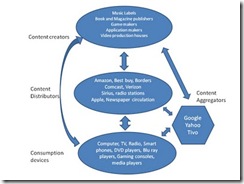Who is Google’s competition?
a. Microsoft
b. Bing, Yahoo
c. Verizon ,Comcast
d. Apple
e. Amazon
f. Tivo
g. All of Above
To get to the truth, it is imperative to understand the broad media industry and the battles going on there. I see media industry comprising of several distinct parts – content creators, content distributors, and consumption device makers.
Content includes written, spoken, visual and interactive content. This includes books, music, videos, photos, games and so on. The content creators such as music labels, publishing houses, game developers, production houses work towards creating media that can generate royalties. They stand to gain by having as much distribution as possible. They also gain when more consumption devices allow consumption of their content. For example, music is more valuable when you can listen to it through car radio, through PC, through DVD players, through internet media players, smart phones and TV rather than when it can be consumed only though CD players.
Content distributors such as Wal-Mart, Best Buy, Comcast, Sirius, iTunes, newsstands and so on work to push the content to consumers in different ways including physical distribution, internet, telecom networks, satellite based distribution and so on. They make money by increasing throughput and providing more choices to the consumers. They can increase the volume and availability if the prices of content goes down. In this way they are not only pitted against each other but also against the content creators.
Consumption device makers make those devices that allow consumers to consume content in different forms. Computers, media players, radios, gaming consoles, smart phones, and e-book readers are all such consumption devices. These firms make their devices more valuable by allowing more content consumption through their device. As a result they would benefit by allowing their devices to use several distribution channels and as much media as possible. Again they st and to benefit if unlimited media is freely available to be consumed through their devices.
As the media exploded, content aggregators and search utility providers emerged. Google is one example where it allows consumers to search and get to the right media. So it TiVo. They make money through advertisement or subscription. Subscription model has not really worked well but advertisement model has made Google extremely successful. They stand to benefit if they get access to all kinds of media – offline or online. They strand to lose if barriers to access to media emerge.
Not only are consumption device makers battling other consumption device makers, they as a group are also battling the content distributors and content creators to capture the most value. So Amazon is battling the content creators (publishing houses), the content distributors (Borders, Wal-Mart etc.), and content aggregators all at the same time. Similarly, Google is fighting not only Microsoft on software, but also all other media industry players mentioned above at the same time. That is what explains Google’s move into Apple’s turf and Apple’s move into Google’s turf.
This broader war in the media industry provides a larger number of exciting choices to players in not only whom to compete against but also whom to ally with to achieve their goals.
In light of this broader picture, Apple’s strategic move of allowing publishers to price higher than $9.99 allows Apple to compete against Amazon not only as a consumption device maker but also as a reseller. Due to such a broad set of players competing against each other for the same media consumption spending of consumers, this is one of the most volatile value landscapes in business. I see the media industry as a great landscape for emergence of several rogue innovations.
In light of this background, I find Apple’s announcement of entry into mobile advertisement business another brilliant move. It is using its success in mobile consumption devices to stake its claim on mobile advertisement.
From Google’s perspective, Apple’s victory in iPhones and iPads may completely shut Google out of the lucrative search on the go and away from desktop. Similarly, Amazon’s victory in Kindle could completely shut itself out of the books related searches on the web and on the go. As a result, all the above is the right answer. Google is now pitted against all the rest of the media industry.
Sometimes, I wonder if Google is doing the right thing by going up against too many players. At the same time, Apple has made some brilliant moves recently that will help Apple shareholders. These moves show how innovation can go beyond simply great products and business models into innovative strategies.






Please note: I reserve the right to delete comments that are offensive, or off-topic. If in doubt, read my Comments Policy.